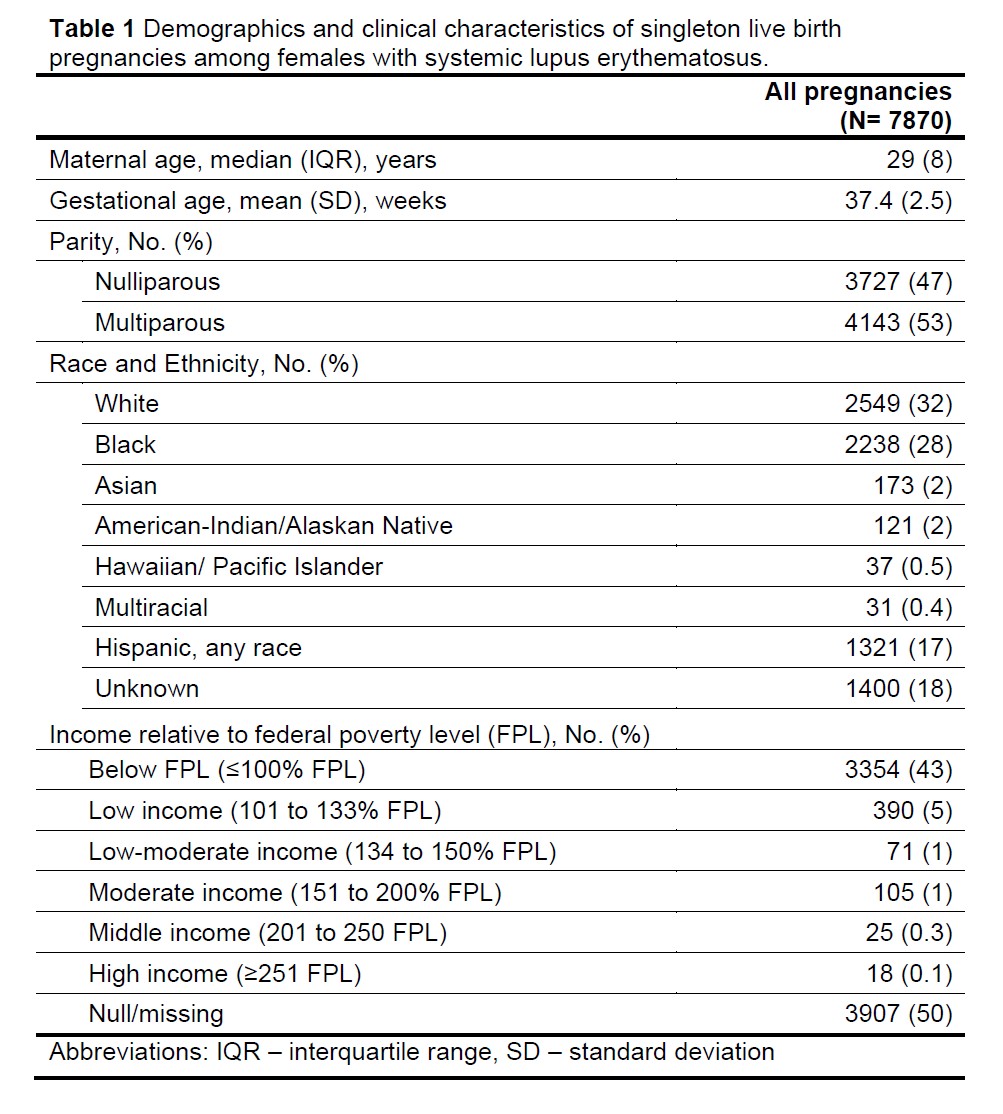Session Information
Date: Tuesday, October 28, 2025
Title: (2195–2226) Reproductive Issues in Rheumatic Disorders Posters
Session Type: Poster Session C
Session Time: 10:30AM-12:30PM
Background/Purpose: Systemic lupus erythematosus (SLE) is a multisystem autoimmune rheumatic disease, predominately affecting women during their reproductive years. Despite widespread evidence that individuals with SLE have a significantly increased risk for depression and anxiety, insight into postpartum depression (PPD) and postpartum anxiety (PPA) is limited. This highlights a significant quality-of-care issue given these conditions are associated with several negative maternal and fetal health outcomes and is a leading cause of maternal death. To address this, we examined national claims data to estimate PPD/PPA prevalence among publicly-insured women with SLE.
Methods: We identified all singleton live births among females aged 15-44 years in Medicaid TAF (T-MSIS Analytic File) between 01/01/2014 and 12/31/2019 applying validated algorithms to inpatient and outpatient files for diagnostic and procedure claims related to end of pregnancy. SLE was defined prior to delivery using the following algorithm: ≥2 SLE coded outpatient visits or ≥1 inpatient visit (ICD9: 710.0; ICD10: M32.1, M32.8, M32.9). PPD, PPA, and post-traumatic stress disorder (PTSD) were conservatively defined as ≥2 outpatient claims or ≥1 inpatient claim coded as depression, anxiety, and PTSD, respectively. All outcomes were assessed within the 60-day postpartum coverage period and up to 365-days postpartum (for those with ongoing coverage). To examine heterogeneity we stratified by parity, and race and ethnicity.
Results: We identified 7870 singleton live births among 6914 women with a diagnosis of SLE. The median maternal age was 29 years (IQR, 8 years), with the majority of participants identifying as White (32%), Black (28%), and Hispanic (17%). (Table 1). The prevalence of PPD for SLE pregnancies was estimated at 6% within the 60-day postpartum coverage period and 16% among those with up to 365 days of continuous coverage. We observed heterogeneity by parity, with a slightly higher prevalence of PPD observed among multipara SLE pregnancies (Table 2). Stratification by race and ethnicity showed the highest prevalence of PPD among White SLE pregnancies (7%, 178/2549), followed by Black (5%, 111/2238) and Hispanic individuals (5%, 68/1321) during the 60-day postpartum period. The prevalence of PPA was 4% within 60-days postpartum, increasing to 14% among those with 365-days of coverage. PTSD was less prevalent, affecting 2-4% of SLE pregnancies in the postpartum period.
Conclusion: Findings highlight that PPD and PPA are important comorbidities to consider in SLE patients and underscores the need for appropriate screening and management strategies. Future analyses will include comparisons with the general obstetric population to enhance the interpretation of these results.
To cite this abstract in AMA style:
Howren A, Rector A, Sediqi S, Simard J. Epidemiologic Evaluation of Postpartum Mental Health for Women Living with Systemic Lupus Erythematosus: A Population-Based Cohort Study Among Medicaid Enrollees [abstract]. Arthritis Rheumatol. 2025; 77 (suppl 9). https://acrabstracts.org/abstract/epidemiologic-evaluation-of-postpartum-mental-health-for-women-living-with-systemic-lupus-erythematosus-a-population-based-cohort-study-among-medicaid-enrollees/. Accessed .« Back to ACR Convergence 2025
ACR Meeting Abstracts - https://acrabstracts.org/abstract/epidemiologic-evaluation-of-postpartum-mental-health-for-women-living-with-systemic-lupus-erythematosus-a-population-based-cohort-study-among-medicaid-enrollees/


.jpg)